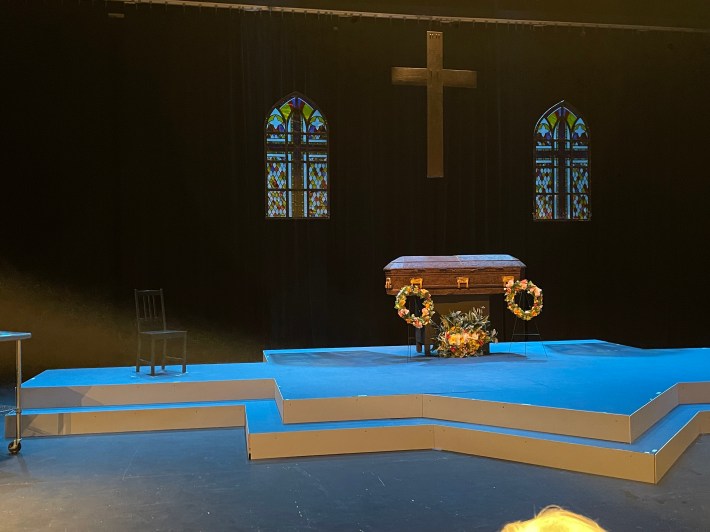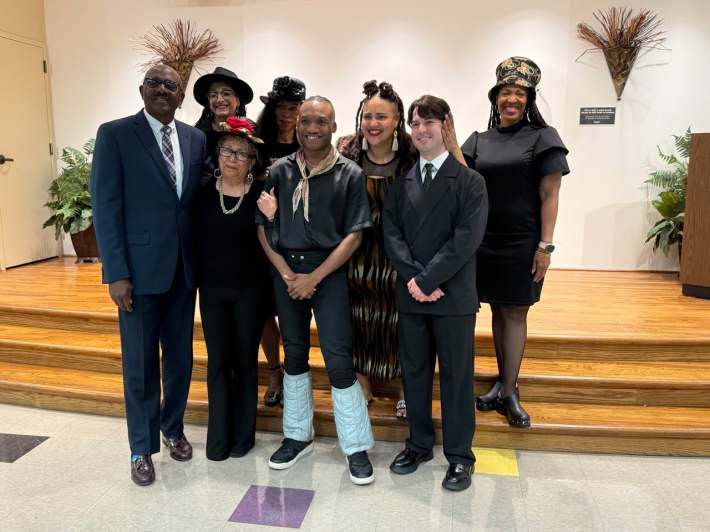Theatre North: “Chicken & Biscuits”
Tulsa Performing Arts Center, Liddy Doenges Theatre
May 18, 2025 (performances run through May 25)
The death of a patriarch is the inciting incident in Douglas Lyons’ Chicken & Biscuits, which Theatre North presents through this weekend—and which affirms that grief can be more than a bleak experience, especially when we use it to open ourselves up instead of locking ourselves away.
The play centers around a fractured family convening for the first time in many years for the funeral of Bernard Jenkins, whose death reunites his two estranged daughters, the tightly-coiled Baneatta (SynCeerae Robbins) and the firecracker Beverly (Jazzy BS). Baneatta is a tenured professor who married a loving pastor and has two adult kids; Beverly is a single mother and college dropout who sets her eyes on bagging a new man at the funeral.
The sisters’ different life paths aren’t the play’s only source of conflict; the tension extends into the next generation, too. Baneatta’s son Kenny brings his white, Jewish boyfriend, Logan, to the service, knowing his mom does not approve. Her daughter, Simone, is freshly free of a toxic engagement that has left her wounded. Beverly's brash daughter La’Trice keeps asking questions no one wants to answer. And Baneatta is keeping a secret from everyone.
If Chicken & Biscuits had been a drama, witnessing and processing these conflicts would have made for a very heavy Sunday afternoon at the TPAC. To my delight, it turned out to be a comedy. You catch the playwright’s tone as soon as you walk into the theater. Stained glass windows hang from the ceiling, flanking a giant cross and framing a coffin: a stark reminder of the death that brings these characters together. But the stage’s warm lights, bright flowers, and pre-show playlist featuring one bop after another clearly signal an approach to death that tracks through life.

The set of “Chicken & Biscuits” at the Liddy Doenges Theatre in the Tulsa Performing Arts Center | photo by Alex Isaak
This play premiered in 2021 on a Broadway stage; it's difficult to translate to a theater with fewer technical capabilities. In a space where you can’t truly isolate areas with lights, curtains, or movable walls, the shifts among several settings in the play’s first 30 minutes (Baneatta’s house, Beverly’s motel room, a generic outdoor space, an Uber, the outside of a church, and a church kitchen) stunt the play’s momentum. Director Jarod Kopp works to mitigate this by giving each opening vignette a distinct location on the stage and giving the actors blocking that plays up laughs.
And the script is very funny. Because of how recently it was written, the jokes are timely and well-delivered by the cast (when they project their voices enough to be heard clearly). Ben Rodriguez’s Logan is a comic riot, his anxiety-riddled body tensing as he navigates social interactions in a family that clearly does not care for him. Ione Blocker brought me to tears twice with her sincere exploration of Simone’s deeper wounds; her scenes with La’Trice (Aniya Ordóñez) and Kenny (Quentin Marcellis) pop with natural chemistry. BS owns the room as Beverly, her performance as delightfully and refreshingly unapologetic as the character. And despite the character’s more unlikable qualities (judgemental, exclusionary, elitist), it’s difficult to root against Robbins as she plays Baneatta’s arc honestly and lovingly, so much so that when she finally allows herself to unwind at the end of the play, I was both laughing and cheering for her.
But the most compelling aspect of the play is the moment when Bernard’s funeral finally begins. Kopp stages the service so that the proceedings at the pulpit are directed toward the audience, inviting us into the play as part of the congregation. We watch each character approach the coffin and say goodbye to Bernard for the last time; they address testimonials and sermons to the audience as well as the rest of the cast.
And in a way that can only happen during live theatre, the audience responded: agreeing when a character said something true, responding to Pastor Reginald’s (Maurice Walker) enlivened call-and-responses, and encouraging the characters to “take your time, honey” when they got choked up during their addresses. The energy fed back to the cast, especially enlivening Walker during the tail end of his sermon.
Just as the performance itself took flight when the actors and the audience opened up to each other, the play’s family begins to heal when they open up and invite others in. Lyons ends his play with a celebration of these family bonds, bringing all the characters together over Bernard’s favorite meal: chicken and biscuits. In the only standard “scene transition” of the play, the crew rolls out a long table in front of the set, and the cast gathers around it to clarify misunderstandings, forgive one another, and welcome newcomers into the family with open arms before sitting down to eat.
Chicken & Biscuits is a heartfelt look into a modern Black family. At times, I wanted it—performances, staging, themes in the script—to go further. But at the same time, in a world that feels bleak, it’s nice to be able to sit back and revel in optimism for two hours. In Lyons’ world, conflict exists, but can be resolved easily, with a bow placed on top. And I need to know where they got that chicken, because it had me salivating.

The cast of “Chicken & Biscuits” presented by Theatre North | photo by Alex Isaak






